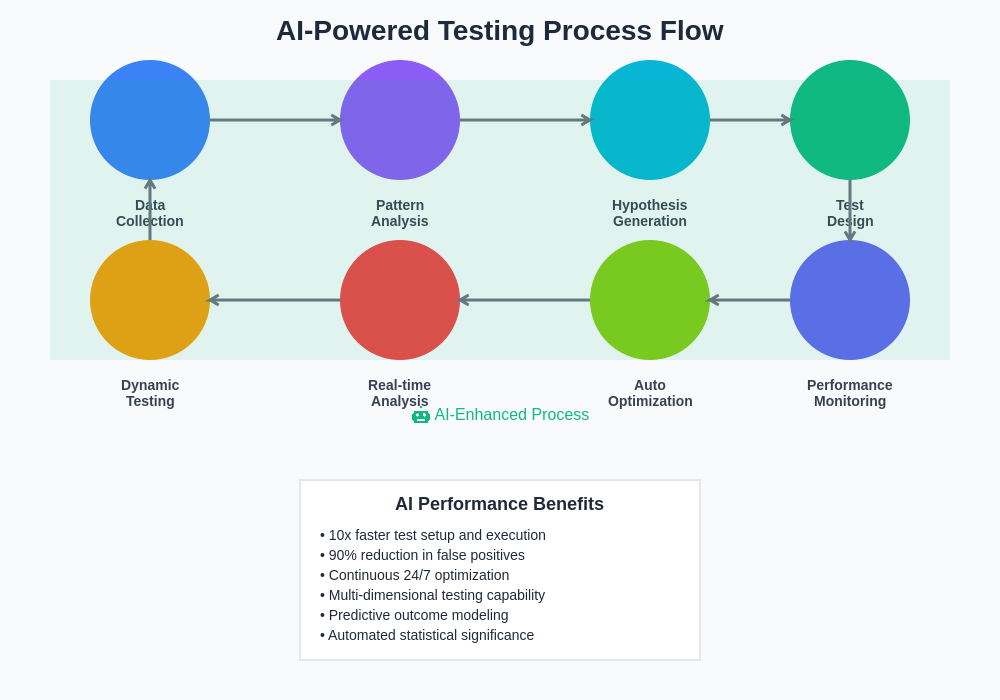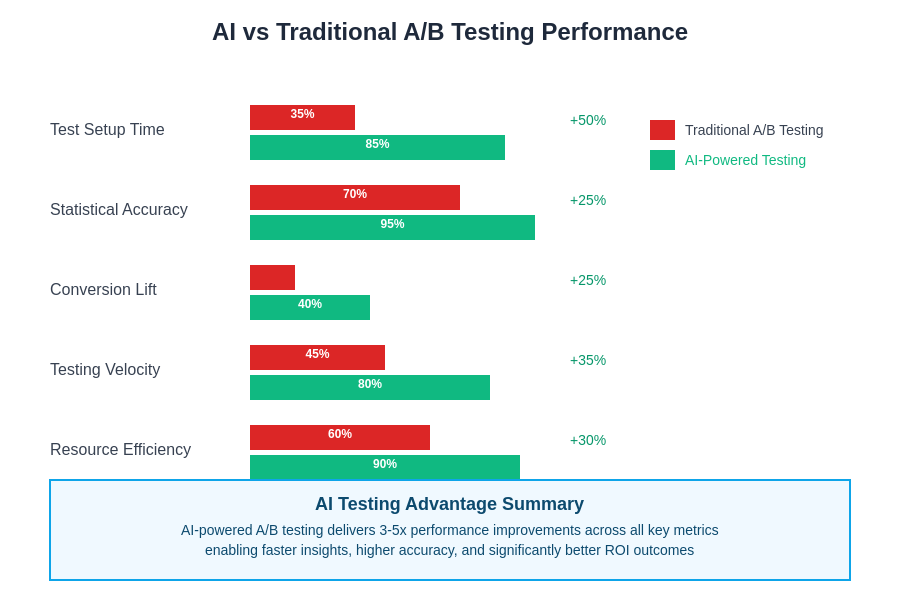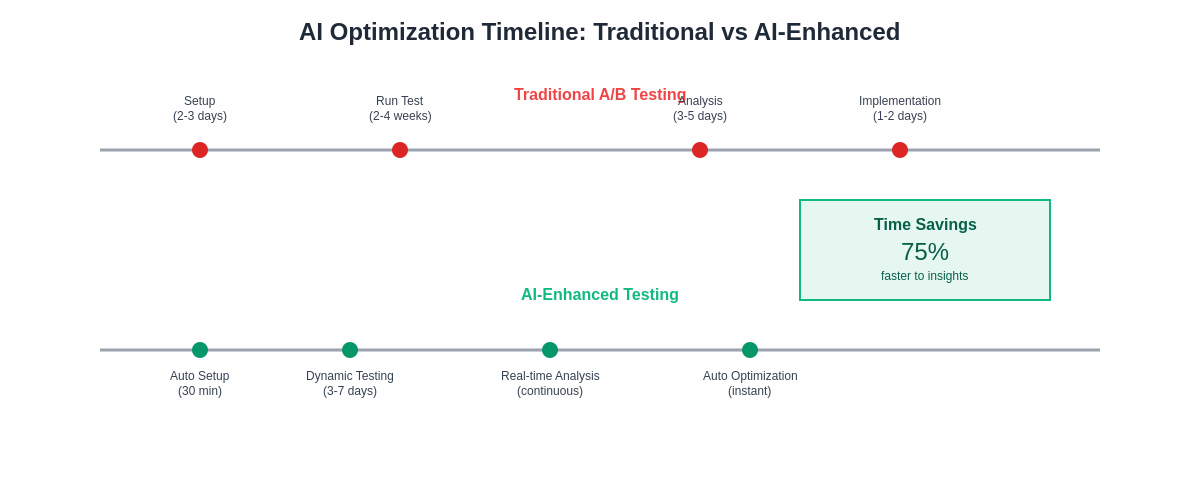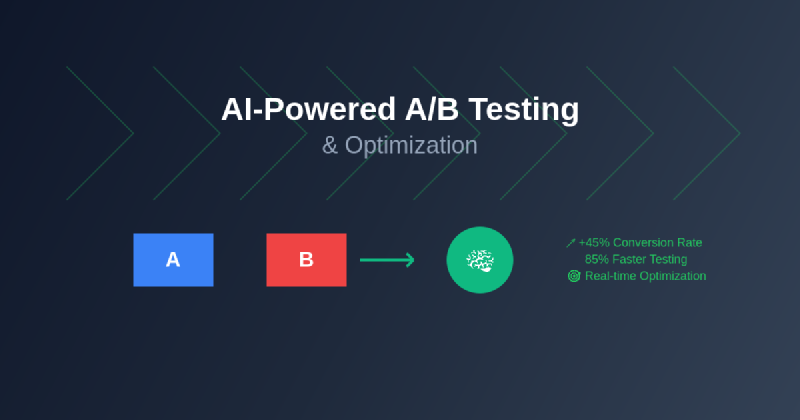The evolution of digital marketing has reached a pivotal moment where artificial intelligence transforms traditional A/B testing methodologies into sophisticated optimization engines capable of delivering unprecedented insights and performance improvements. This revolutionary approach to experimentation and conversion optimization represents a fundamental shift from manual, time-intensive testing processes to intelligent, automated systems that continuously learn, adapt, and optimize marketing campaigns in real-time.
Explore the latest AI marketing trends to understand how cutting-edge technologies are reshaping digital marketing strategies and creating new opportunities for businesses to maximize their conversion rates. The integration of artificial intelligence into A/B testing workflows has unlocked capabilities that were previously impossible, enabling marketers to test multiple variables simultaneously, predict outcomes with remarkable accuracy, and implement optimization strategies that adapt dynamically to changing user behaviors and market conditions.
The Foundation of Intelligent Testing
Traditional A/B testing methodologies have served marketers well for decades, providing valuable insights into user preferences and behavior patterns through controlled experimentation. However, these conventional approaches are inherently limited by their reliance on manual hypothesis generation, sequential testing protocols, and static experimental designs that cannot adapt to real-time performance data. The emergence of AI-powered testing platforms has addressed these limitations by introducing sophisticated algorithms capable of managing complex multivariate experiments, generating dynamic hypotheses based on historical performance data, and optimizing campaigns continuously without human intervention.
The transformation from traditional to AI-enhanced testing represents more than a technological upgrade; it signifies a fundamental reimagining of how businesses approach optimization and experimentation. Modern AI systems can analyze vast datasets to identify patterns invisible to human analysts, predict the likely success of different test variations before implementation, and automatically adjust testing parameters to maximize statistical significance while minimizing time to insights. This intelligent approach enables organizations to achieve optimization results that would require months of traditional testing in a fraction of the time.
Advanced Machine Learning Algorithms in Testing
The core strength of AI-powered A/B testing lies in its sophisticated machine learning algorithms that can process and analyze complex datasets to identify optimization opportunities that traditional methods might miss entirely. These algorithms employ techniques such as Bayesian optimization, reinforcement learning, and neural network analysis to understand user behavior patterns, predict conversion probabilities, and automatically adjust campaign parameters to maximize desired outcomes.
Bayesian optimization techniques enable AI systems to make probabilistic predictions about test outcomes based on historical data and real-time performance metrics, allowing for more efficient resource allocation and faster identification of winning variations. Reinforcement learning algorithms continuously adapt testing strategies based on observed results, learning which approaches yield the best outcomes and automatically adjusting future experiments to incorporate these insights. Neural networks can identify complex patterns in user behavior data that might not be apparent through traditional statistical analysis, uncovering optimization opportunities that human analysts might overlook.
Leverage advanced AI capabilities with Claude for comprehensive data analysis and strategic optimization recommendations that can transform your testing and conversion optimization efforts. The combination of these advanced algorithms creates a testing environment where optimization decisions are based on comprehensive data analysis rather than intuition or limited sample testing, resulting in more reliable and impactful optimization outcomes.
Dynamic Multivariate Testing Capabilities
One of the most significant advantages of AI-powered testing platforms is their ability to conduct sophisticated multivariate experiments that would be practically impossible to manage using traditional methodologies. While conventional A/B testing typically limits experiments to comparing two or three variations of a single element, AI systems can simultaneously test dozens of variables across multiple campaign components, automatically identifying the optimal combinations that maximize conversion rates and user engagement.
This dynamic multivariate capability extends beyond simple element testing to encompass comprehensive campaign optimization that considers the complex interactions between different marketing components. AI algorithms can analyze how changes in headline copy affect the performance of call-to-action buttons, how different color schemes impact user behavior across various demographic segments, and how timing adjustments influence conversion rates for different traffic sources. This holistic approach to optimization ensures that campaigns are optimized as integrated systems rather than collections of individually optimized elements.

The comprehensive AI testing workflow demonstrates how machine learning algorithms create a continuous optimization cycle that far exceeds the capabilities of traditional testing methodologies. This integrated approach ensures that every aspect of the testing process is enhanced through artificial intelligence, from initial data collection through final performance monitoring.
The automation of multivariate testing also enables continuous optimization cycles where AI systems constantly monitor campaign performance, identify new testing opportunities, and implement optimizations without disrupting ongoing campaigns. This continuous improvement process ensures that marketing campaigns maintain optimal performance even as market conditions, user preferences, and competitive landscapes evolve over time.
Predictive Analytics and Performance Forecasting
AI-powered testing platforms excel in their ability to provide predictive insights that enable marketers to make informed decisions about resource allocation, campaign strategy, and optimization priorities before investing significant time and budget in full-scale implementations. These predictive capabilities leverage historical performance data, industry benchmarks, and real-time market analysis to forecast the likely outcomes of different testing scenarios with remarkable accuracy.
Machine learning models can analyze patterns in user behavior data to predict which audience segments are most likely to respond positively to specific campaign variations, enabling more targeted and efficient testing strategies. Predictive analytics also help identify seasonal trends, market fluctuations, and external factors that might influence campaign performance, allowing marketers to adjust their testing strategies proactively rather than reactively responding to performance changes.
The forecasting capabilities of AI systems extend to budget optimization, where algorithms can predict the resource requirements for achieving specific performance targets and recommend optimal budget allocation strategies across different campaigns and channels. This predictive approach to resource management ensures that testing budgets are utilized efficiently and that optimization efforts focus on areas with the highest potential for meaningful impact.
Real-Time Optimization and Adaptive Learning
The real-time processing capabilities of AI-powered testing platforms represent a quantum leap forward from traditional testing methodologies that require manual analysis and implementation cycles. Modern AI systems can monitor campaign performance continuously, identify optimization opportunities as they emerge, and implement improvements automatically without disrupting ongoing campaigns or requiring manual intervention.
This real-time optimization capability is particularly valuable in dynamic marketing environments where user behavior, competitive conditions, and market factors change rapidly. AI algorithms can detect performance anomalies, identify trending patterns, and adjust campaign parameters to maintain optimal performance even as external conditions fluctuate. The adaptive learning capabilities of these systems ensure that optimization strategies become more sophisticated and effective over time as they accumulate more data and experience.
The automation of optimization processes also enables 24/7 campaign management where AI systems continuously monitor performance metrics, test new variations, and implement improvements around the clock. This constant optimization cycle ensures that campaigns maintain peak performance regardless of time zones, market conditions, or human resource availability, maximizing the return on marketing investments and minimizing missed optimization opportunities.
Enhance your research and analysis capabilities with Perplexity to gather comprehensive market intelligence and competitive insights that can inform your AI-powered testing strategies. The combination of real-time optimization and comprehensive market analysis creates a testing environment where campaigns are continuously refined based on both internal performance data and external market intelligence.
Personalization and Audience Segmentation
AI-powered testing platforms excel in creating highly personalized optimization strategies that recognize and adapt to the diverse preferences and behaviors of different audience segments. Traditional A/B testing often treats audiences as homogeneous groups, potentially missing optimization opportunities that arise from the varied preferences and behaviors of different user segments. AI systems can automatically identify distinct audience segments based on behavior patterns, demographic characteristics, and engagement history, then optimize campaigns specifically for each segment.
This sophisticated segmentation capability enables the creation of dynamic campaigns that present different variations to different users based on their predicted preferences and likelihood of conversion. Machine learning algorithms can analyze user interaction data to understand which messaging resonates with specific demographic groups, which visual elements appeal to different customer segments, and which offers are most compelling for users at different stages of the customer journey.
The personalization capabilities extend to timing optimization, where AI systems can determine the optimal times to present specific offers or content to different user segments based on their historical engagement patterns and predicted availability. This temporal personalization ensures that marketing messages reach users when they are most likely to be receptive and engaged, significantly improving conversion rates and user experience quality.
Statistical Significance and Confidence Optimization
One of the most challenging aspects of traditional A/B testing involves determining when tests have achieved statistical significance and can be confidently implemented at scale. AI-powered testing platforms address this challenge through sophisticated statistical analysis algorithms that continuously monitor test results and automatically determine when sufficient data has been collected to make confident optimization decisions.
These AI systems employ advanced statistical techniques such as sequential probability ratio testing, Bayesian inference, and confidence interval analysis to minimize the time required to achieve statistical significance while maintaining high confidence levels in test results. The algorithms can also adjust testing parameters dynamically to optimize for statistical power, reducing the sample sizes required for meaningful results and accelerating the testing cycle.
The automation of statistical analysis also eliminates human bias and error from the decision-making process, ensuring that optimization decisions are based purely on data-driven insights rather than subjective interpretations of test results. This objective approach to statistical analysis improves the reliability and reproducibility of optimization outcomes while reducing the risk of implementing changes based on incomplete or misleading data.

The quantitative advantages of AI-powered testing become clear when examining key performance metrics across multiple dimensions. Organizations implementing AI-enhanced testing consistently achieve superior results in test setup efficiency, statistical accuracy, conversion improvements, and overall return on investment compared to traditional testing approaches.
Integration with Marketing Technology Stacks
Modern AI-powered testing platforms are designed to integrate seamlessly with existing marketing technology ecosystems, enabling comprehensive optimization strategies that span multiple channels, platforms, and customer touchpoints. These integrations allow AI systems to access comprehensive customer data from CRM systems, analytics platforms, email marketing tools, and social media management systems, creating a unified view of customer behavior and campaign performance.
The integration capabilities enable cross-channel optimization where AI algorithms can analyze how changes in one marketing channel affect performance across other channels, identifying optimization opportunities that might not be apparent when analyzing channels in isolation. For example, AI systems can determine how email campaign optimizations influence social media engagement, how website changes affect paid advertising performance, and how content modifications impact organic search rankings.
These comprehensive integrations also enable automated workflow optimization where AI systems can coordinate optimization activities across multiple platforms and channels, ensuring that changes are implemented consistently and that performance is monitored holistically. This integrated approach to optimization maximizes the impact of testing activities and ensures that optimization efforts are aligned across all marketing activities.
Advanced Attribution and Impact Analysis
Understanding the true impact of optimization activities requires sophisticated attribution modeling that can account for the complex interactions between different marketing channels, customer touchpoints, and external factors that influence conversion behavior. AI-powered testing platforms employ advanced attribution algorithms that can accurately measure the incremental impact of optimization activities while controlling for external variables and confounding factors.
These attribution models utilize machine learning techniques to identify causal relationships between optimization activities and performance outcomes, distinguishing between correlation and causation to provide accurate assessments of optimization impact. The algorithms can account for factors such as seasonality, competitive activities, economic conditions, and marketing mix interactions that might otherwise confound the analysis of test results.
The advanced attribution capabilities also enable long-term impact analysis where AI systems can track the sustained effects of optimization activities over extended periods, identifying which optimizations provide lasting improvements versus those that deliver only temporary performance gains. This long-term perspective on optimization impact helps marketers prioritize activities that deliver sustainable competitive advantages and lasting performance improvements.
Cost Optimization and Resource Allocation
AI-powered testing platforms provide sophisticated cost optimization capabilities that help marketers maximize the return on their testing and optimization investments. These systems can analyze the cost-effectiveness of different testing strategies, predict the resource requirements for achieving specific performance targets, and recommend optimal budget allocation strategies across different campaigns and channels.
Machine learning algorithms can identify which types of tests and optimizations deliver the highest return on investment, enabling marketers to prioritize their testing activities based on expected impact and resource requirements. The systems can also optimize testing schedules to minimize costs while maximizing insights, determining the optimal duration for tests and the most efficient sequencing of testing activities.
The cost optimization capabilities extend to traffic allocation optimization, where AI algorithms can determine the optimal distribution of traffic between control and test variations to minimize the opportunity cost of testing while maintaining statistical validity. This approach ensures that testing activities do not significantly impact campaign performance while still generating reliable optimization insights.

The dramatic time savings achieved through AI-powered testing become evident when comparing traditional testing timelines with AI-enhanced processes. While conventional A/B testing cycles can extend for weeks or months, AI-powered systems can deliver actionable insights in days while maintaining higher accuracy and statistical confidence.
Competitive Intelligence and Market Analysis
Advanced AI-powered testing platforms incorporate competitive intelligence and market analysis capabilities that provide context for optimization decisions and help identify emerging trends and opportunities. These systems can monitor competitor activities, analyze market conditions, and identify external factors that might influence campaign performance and optimization priorities.
The competitive intelligence capabilities enable benchmarking of optimization results against industry standards and competitor performance, helping marketers understand whether their optimization outcomes represent genuine competitive advantages or merely industry-standard improvements. AI algorithms can also identify competitive gaps and opportunities where optimization activities might deliver disproportionate competitive advantages.
Market analysis capabilities help identify optimal timing for different types of optimization activities, recognizing when market conditions are favorable for specific types of tests and when external factors might interfere with accurate result interpretation. This market-aware approach to optimization timing ensures that testing activities are conducted under optimal conditions and that results are interpreted within appropriate market context.
Future Evolution and Emerging Capabilities
The rapid advancement of artificial intelligence technologies promises continued evolution in the capabilities and sophistication of AI-powered testing and optimization platforms. Emerging technologies such as quantum computing, advanced neural architectures, and edge computing are likely to enable even more sophisticated optimization capabilities that can process larger datasets, identify more complex patterns, and implement optimizations with greater precision and speed.
The integration of emerging technologies such as augmented reality, voice interfaces, and Internet of Things devices will expand the scope of optimization activities to encompass new customer touchpoints and interaction modalities. AI systems will need to develop optimization strategies for these new channels while maintaining consistency across traditional digital marketing channels.
The future of AI-powered optimization also includes the development of more sophisticated ethical and privacy-preserving optimization techniques that can deliver personalized experiences while respecting user privacy and maintaining regulatory compliance. These developments will ensure that AI-powered optimization continues to deliver value while addressing growing concerns about data privacy and algorithmic transparency.
The continued evolution of AI-powered testing and optimization represents an ongoing transformation in how businesses approach customer experience optimization, marketing effectiveness, and competitive positioning. Organizations that embrace these emerging capabilities and integrate them effectively into their marketing strategies will be well-positioned to achieve sustainable competitive advantages in increasingly complex and dynamic market environments.
Disclaimer
This article is for informational purposes only and does not constitute professional marketing or technical advice. The views expressed are based on current understanding of AI technologies and their applications in marketing optimization. Readers should conduct their own research and consider their specific business requirements when implementing AI-powered testing and optimization solutions. The effectiveness of AI-driven optimization may vary depending on specific use cases, industry contexts, and implementation approaches. Organizations should ensure compliance with applicable data privacy regulations and ethical guidelines when implementing AI-powered marketing technologies.
